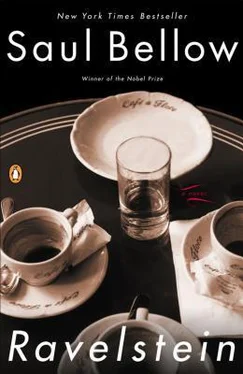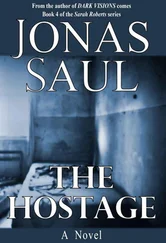But it was just this absurdity that Ravelstein liked. "You never do the safe thing if there's a risky alternative. You're what people would call feckless, in the days when such words were still in use. Of course we're good and fed up with personality profiles, or defects. One reason why violence is so popular may be that psychiatric insights have worn us out and we get satisfaction from seeing them blown away with automatic weapons, or exploding in cars, or being garroted or stuffed by taxidermists. We're so sick of having to think about everybody's problems-Grand Guignol mock-destruction isn't good enough for the bastards."
He liked to raise his long arms over the light gathered on his bald head and give a comic cry.
It occurs to me that this account of mine will lead to charges of misanthropy. Ravelstein was anything but a misanthrope or a cynic. He was as generous as they come-a reservoir, a source of energy for the students he accepted. Many came with the good democratic premise that he should oblige them all and share his ideas with them. Of course he refused to let himself be used, enjoyed-tapped by idlers. "I'm not the pipe at Saratoga Springs, where the Bronx Jews came in summer with cups to drink life-giving water for free-a remedy for constipation or hardening of the arteries. I'm not a free commodity or public giveaway, _am__ I! Incidentally the wonder-working water turned out to be carcinogenic. Bad for the liver. Worse for the pancreas." He laughed at this-not with pleasure.
If these characters hadn't come by bus and train to drink Saratoga water they would have eaten or drunk something just as deadly in Flatbush or Brownsville. How can you tabulate the endless dangers of tobacco, of food preservatives, asbestos, the stuff the crops are sprayed with-the _E. coli__ from raw chicken on the hands of the kitchen employees. "Nothing is more bourgeois than the fear of death," Ravelstein would say. He gave these little anti-sermons in a wacko style. He reminded me of the rag-doll dancers, clowns of the twenties who waved their tattered, nerveless long arms and painted huge smiles on their powdered faces. So that Ravelstein's serious preoccupations "coexisted," to borrow a word from twentieth-century politics, with his buffoonery. Only his friends saw this side of him. He could be correct enough on serious occasions, not as a concession to academic fussbudgets but because there were real issues to be considered-matters related to the purpose of our existence: say, the correct ordering of the human soul-and there he was as stable and earnest as any of the deepest and greatest of teachers. Ravelstein was vigorous and hard. Although even while teaching one of his Platonic dialogues he allowed himself to cut a caper. He sometimes said, "Yes, I play the _pitre__."
"The straight man."
"The buffoon."
We had both lived in France. The French were genuinely educated-or had been so once. They had taken a bad beating in this century. However, they had a real feeling for beautiful objects still, for leisure, for reading and conversation; they didn't despise creaturely needs-the human basics. I keep making this pitch for the French.
On any street you could buy a baguette, a pair of underpants _taille grand patron__, or beer or brandy or coffee or _charcuterie__. Ravelstein was an atheist, but there was no reason why an atheist should not be influenced by the Sainte-Chapelle, should not read Pascal. For a civilized man there was no background, no atmosphere like the Parisian. For my part I had often felt myself hustled and despised by Parisians. I didn't see Vichy solely as a product of the Nazi occupation. I had ideas of my own about collaboration and fascism.
"I don't know whether it's your Jewish edginess or your unnatural need for a friendly welcome," said Ravelstein. "Or maybe you feel the Frenchies are ungrateful. I don't believe it's hard to prove that Paris is a better place than Detroit or Newark or Hartford."
It was a minor disagreement involving no big principles. Abe had excellent friends in Paris. He was well received by the _йcoles__ and _instituts__ where he lectured on French subjects in his own sort of French. He himself had studied in Paris years ago under the famous Hegelian and high official Alexander Kojиve, who had educated a whole generation of influential thinkers and writers. Among these Abe had quite a few buddies, admirers, readers. In the States he was controversial. He had more enemies at home than any normal per son could want, especially among social scientists and philosophers.
But I have only the limited knowledge of these things that a non-specialist can have. Abe Ravelstein and I were close friends. We lived on the same street, and we were in almost daily contact. I was often invited to attend his seminars and to discuss literature with graduate students. In the old days there was still a considerable literary community in our country, and medicine and law were still "the learned professions," but in an American city today you can no longer count on doctors, lawyers, businessmen, journalists, politicians, television personalities, architects, or commodities traders to discuss Stendhal's novels or Thomas Hardy's poems. You occasion ally do come across a reader of Proust or a crank who has memorized whole pages of _Finnegans Wake__. I like to say, when I am asked about Finnegan, that I am saving him for the nursing home. Better to enter eternity with Anna Livia Plurabelle than with the Simpsons jittering on the TV screen.
I wonder what terms to apply to Ravelstein's large, handsome apartment-his Midwestern base. It wouldn't be right to describe it as a sanctuary: Abe was in no sense a fugitive. Nor a solitary. He was actually on good terms with his American surroundings. His windows gave him a huge view of the city. He seldom had to use public transportation in his later years, but he knew his way around, he spoke the language of the city. Young blacks would stop him in the street to ask about his suit or his topcoat, his fedora. They were familiar with high fashion. They talked to him about Ferre, Lanvin, about his Jermyn Street shirtmaker. "These young dudes," he explained, "are lovers of high fashion. Zoot suits and such crudities are things of the past. They're extremely savvy about automobiles, too."
"And maybe about twenty-thousand-dollar wristwatches. And what about handguns?"
Ravelstein laughed. "Even black women stop me in the street to comment on the cut of my suits," he said. "They're intuitively responsive."
His heart warmed toward such connoisseurs-lovers of elegance.
The admiration of black adolescents helped Ravelstein to offset the hatred of his colleagues, the professors. The popular success of his book drove the academics mad. He exposed the failings of the system in which they were schooled, the shallowness of their historicism, their susceptibility to European nihilism. A summary of his argument was that while you could get an excellent technical training in the U.S., liberal education had shrunk to the vanishing point. We were in thrall to the high tech, which had transformed the modern world. The older generation saved toward the education of its children. The cost of a B.A. had risen to $150,000. Parents might as well flush these dollars down the toilet, Ravelstein believed. No real education was possible in American universities except for aeronautical engineers, computerists, and the like. The universities were excellent in biology and the physical sciences, but the liberal arts were a failure. The philosopher Sidney Hook had told Ravelstein that philosophy was finished. "We have to find jobs for our graduates as medical ethicists in hospitals," Hook had admitted.
Ravelstein's book was not at all wild. Had he been a noisy wind bag he would have been easy to dismiss. No, he was sensible and well informed, his arguments were thoroughly documented. All the dunces were united against him (as Swift or maybe Pope ex pressed it long ago). If they had had the powers of the FBI, the professors would have put Ravelstein on "most wanted" posters like those in federal buildings.
Читать дальше












